

Becoming More Agile. The Perfect Conditions for Entering A New Innovation Era in 2017. So if there was ever a time to clear the existing innovation agenda and rework the entire space for innovating, it is about to become the pressing reality as we enter into 2017.
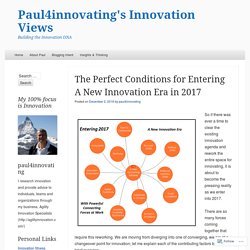
There are so many forces coming together that require this reworking. We are moving from diverging into one of converging, we are at a changeover point for innovation; let me explain each of the contributing factors but firstly, a brief overview. The Merging Conditions and Forces The very different political and economic conditions that will be arising in 2017, the continuing shifting social conditions, profound shifts we are undergoing in business and our own personal ones, makes it a world that is moving from being complicated to complex. The Collapse of Traditional Structures: An Ecosystem Evolution. In my previous post on the Transformation of Interaction, I mentioned the emergence of ecosystems and their likely impact on how we experience life.
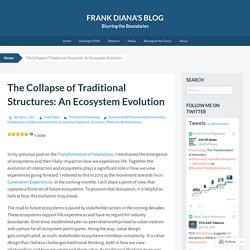
Together, the evolution of interaction and ecosystems plays a significant role in how we view experiences going forward. I referred to this in 2013 as the movement towards Next Generation Experiences. In the coming months, I will share a point of view that captures a finite set of future ecosystems. What Is Wirearchy ? – Wirearchy. Over the past 10+ years, ask thousands of people have asked me “what is wirearchy?”
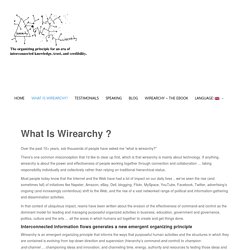
There’s one common misconception that I’d like to clear up first, which is that wirearchy is mainly about technology. If anything, wirearchy is about the power and effectiveness of people working together through connection and collaboration … taking responsibility individually and collectively rather than relying on traditional hierarchical status. Most people today know that the Internet and the Web have had a lot of impact on our daily lives .. we’ve seen the rise (and sometimes fall) of initiatives like Napster, Amazon, eBay, Dell, blogging, Flickr, MySpace, YouTube, Facebook, Twitter, advertising’s ongoing (and increasingly contentious) shift to the Web, and the rise of a vast networked range of political and information-gathering and dissemination activities.
Sketch Note: 6 Rules of Change by Esther Derby. Esther Derby is a highly respected voice in building up agile environments, organizations and teams for success.
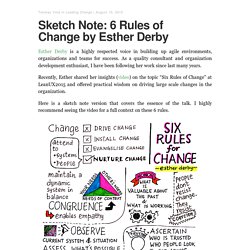
As a quality consultant and organization development enthusiast, I have been following her work since last many years. Recently, Esther shared her insights (video) on the topic “Six Rules of Change” at LeanUX2015 and offered practical wisdom on driving large scale changes in the organization. Here is a sketch note version that covers the essence of the talk. Say what you see! A systems thinker in a normal organisation. Or why Vanguard, Deming & systems thinking is bad for you.
Thoreau on Hard Work, the Myth of Productivity, and the True Measure of Meaningful Labor. By Maria Popova “Those who work much do not work hard.”
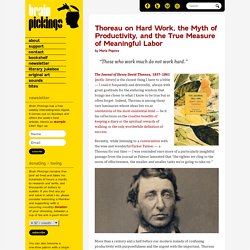
The Journal of Henry David Thoreau, 1837–1861 (public library) is the closest thing I have to a bible — I read it frequently and devotedly, always with great gratitude for the enduring wisdom that brings me closer to what I know to be true but so often forget. Indeed, Thoreau is among those rare luminaries whose ideas live on as resolutions of the most existential kind — be it his reflections on the creative benefits of keeping a diary or the spiritual rewards of walking or the only worthwhile definition of success. Recently, while listening to a conversation with the wise and wonderful Parker Palmer — a Thoreau for our time — I was reminded once more of a particularly insightful passage from the journal as Palmer lamented that “the tighter we cling to the norm of effectiveness, the smaller and smaller tasks we’re going to take on.”
He does nothing with haste and drudgery, but as if he loved it. Donating = Loving. Vers une théorie des entreprises stupides? Réfléchir, se projeter, anticiper, remettre en cause ses méthodes ou étudier la pertinence de ses stratégies peut aider une entreprise à surmonter des crises ou à gagner de nouveaux marchés...
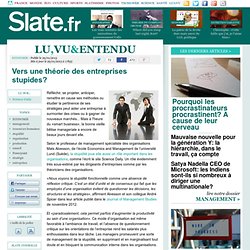
Mais à l'heure du «smart business», la bonne vieille bêtise manageriale a encore de beaux jours devant elle. Selon le professeur de management spécialiste des organisations Mats Alvesson, de l’école Economics and Management de l’université Lund (Suède), la stupidité joue elle aussi un rôle important dans les organisations, comme l’écrit le site Science Daily. Un rôle évidemment très sous-estimé par les dirigeants d'entreprises comme par les théoriciens des organisations. «Nous voyons la stupidité fonctionnelle comme une absence de réflexion critique. Un patron avec ses salariés dans l'open-space, c'est mieux? Temps de lecture: 7 min La première fois que j’ai rencontré Jack Dorsey, le milliardaire cofondateur de Twitter, il travaillait sur son nouveau projet, Square –son entreprise post-Twitter lancée pour perturber le secteur du paiement en ligne.

Votre présence au bureau n'est plus obligatoire. Quand les entreprises permettent à leurs employés de faire tout ce qu’ils le veulent, du moment que le travail est fait.
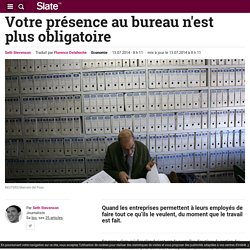
En 2003, alors qu’elles planchaient sur de nouvelles directives de gestion des ressources humaines pour Best Buy, un important distributeur de matériel électronique américain, Cali Ressler et Jody Thompson eurent une idée révolutionnaire. Elles se demandèrent ce qui arriverait si l’on accordait aux employés une autonomie totale en échange d’une responsabilité totale. La Pyramide de Maslow appliquée au coworking. Les managers se comportent-ils vraiment plus efficacement que des rats ?
Lorsqu'ils sont face à la prise de décision dans le cadre managérial, les managers se comportent-ils vraiment plus efficacement que des rats ?
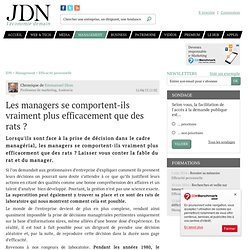
Laisser vous conter la fable du rat et du manager. Si l’on demandait aux gestionnaires d’entreprise d’expliquer comment ils prennent leurs décisions on pourrait sans doute s’attendre à ce que qu’ils justifient leurs actions en citant des qualités comme une bonne compréhension des affaires et un talent d’analyse bien développé. Pourtant, la gestion n’est pas une science exacte. La superstition peut également y trouver sa place et ce sont des rats de laboratoire qui nous montrent comment cela est possible. Souffrance au travail : oubliez le psychologue ! Les risques psychosociaux ont été instrumentalisés et ont masqué l’enjeu politique des conflits en entreprise, selon la psychologue du travail Lise Gaignard.

LE MONDE | • Mis à jour le | Par Margherita Nasi Entre 2007 et 2014, la psychologue du travail Lise Gaignard rédige des chroniques à partir d’entretiens menés dans son cabinet. Elle souligne les phrases les plus affligeantes, les retape, et change les prénoms. Come motivare i dipendenti e i collaboratori creativi. 6 Buddhist Principles That Will Help You Be A Better Boss. Think of your top inspirations for building a company and leading your team: Steve Jobs, Larry Page, Richard Branson are sure to make the cut.
Probably not Buddha. But Shambhala Buddhist teacher and author Lodro Rinzler makes a case for infusing Buddhist principles into the workplace in his new book The Buddha Walks Into the Office. Great Brands Are About Fusing Product And Service. How Do You Do It? For the past 40 years, futurists, economists, and media mavens have debated which business strategies are best suited for the networked, postindustrial era. In his 1971 book, Future Shock, the futurist Alvin Toffler talked about the upcoming “experiential industry,” in which people would be willing to allocate high percentages of their salaries to live amazing experiences.
Toffler’s prediction has proven prophetic. We are happy to visit Disneyland or pay real money for virtual goods because they amuse and delight us. Brands are symbols of experiences, and we have learned not to question brand premiums. Spending $200 for an Armani shirt makes perfect sense because the luxury experience and self-expression create an intangible value beyond the mere cloth. Apple has been held up as the definitive example of how to integrate a brand and its products and services to create an extraordinary company. The iPhone is a product that delivers services and fulfills the promise of the Apple brand. 1. Chi divide perde, chi condivide vince.